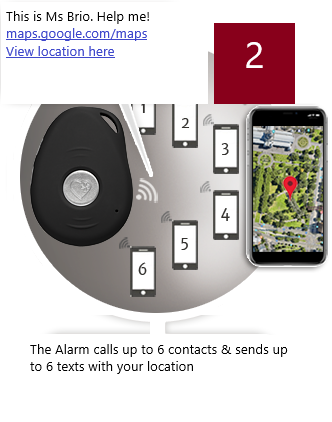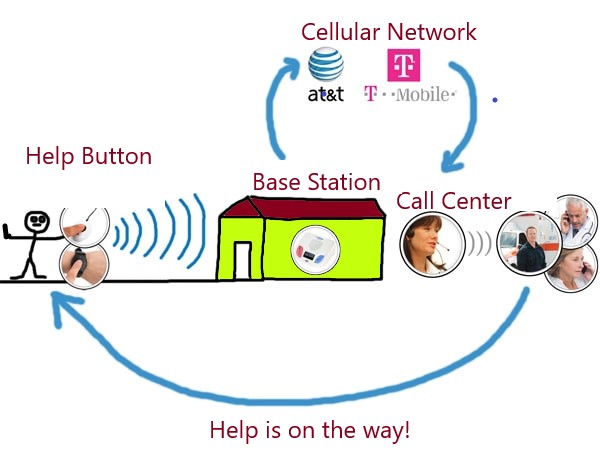Does Life Alert Track Your Location?
Life Alert only tracks your location if you have purchased a model with GPS tracking capabilities. The standard Life Alert system does not come with GPS tracking, and the emergency response center cannot locate you through the base unit. Life Alert will access your location information in an emergency if you have a GPS-enabled device.
Life Alert is a medical alert system that has become increasingly popular among seniors and people with disabilities. The system allows users to get help quickly in an emergency by pressing a button on a pendant or wristband.

How Life Alert Works
To understand whether Life Alert tracks your location, it is essential to understand how the system works. Life Alert uses a base unit and a wearable device, usually a pendant or wristband, to connect users to a 24/7 emergency response center. When users press the button on their device, the system connects them to an operator who can dispatch emergency services or contact designated family members or caregivers.
GPS Tracking
GPS tracking is a technology that can be used to track the location of a device or person. Some medical alert systems, including some newer models of Life Alert, come with GPS tracking capabilities. This technology can be helpful in emergencies, as it allows emergency responders to locate the user quickly. However, GPS tracking also raises privacy concerns, allowing others to track the user’s location.
Pros and Cons of GPS Tracking
GPS tracking can be useful in medical alert systems, especially for people with mobility or cognitive issues who risk wandering or becoming lost. However, there are also potential drawbacks to consider. Here are some pros and cons of GPS tracking in medical alert systems:
Pros:
- Location tracking: GPS tracking allows emergency responders to locate the wearer quickly. This is especially important for people who live alone or have mobility or cognitive issues that could make it difficult to communicate their location.
- Peace of mind: Knowing that a loved one’s location can be tracked at all times can give family members and caregivers peace of mind.
- Flexibility: GPS tracking can work in many different environments, including outdoors and in areas with poor cellular reception.
Cons:
- Privacy concerns: Some people may be uncomfortable with being tracked at all times. This could be a particular concern for individuals who are not cognitively impaired but still require a medical alert system for other reasons.
- Cost: GPS tracking features can add to the cost of a medical alert system.
- Battery life: GPS tracking can drain the battery of a medical alert device more quickly than other features. This could concern people who need help remembering to charge their devices regularly.
- False alarms: GPS tracking is not always accurate, and there is a risk of false alarms being triggered if the location data is not up to date.
In conclusion, GPS tracking can be useful in medical alert systems. Still, weighing the potential benefits and drawbacks is important before deciding whether it is right for a particular individual.
Privacy Concerns
If you have a Life Alert device with GPS tracking capabilities, you should be aware of the privacy concerns associated with this technology. GPS tracking lets others know your location, which can be a concern if you don’t want others to know where you are. Additionally, GPS tracking can be inaccurate, leading emergency responders to the wrong location.
FAQs
Does Life Alert work outside the home?
Yes, Life Alert works inside and outside the home as long as you are within range of the base unit. If you have a GPS-enabled device, you can use Life Alert to call for help from anywhere.
Can Life Alert be used without a landline?
Yes, Life Alert offers wireless options that do not require a landline. These systems use cellular or wireless networks to connect users to the emergency response center.
Can I cancel Life Alert at any time?
Yes, you can cancel your Life Alert service at any time. However, depending on your contract, you may be subject to a cancellation fee.
How much does Life Alert cost?
The cost of Life Alert varies depending on the system and options you choose. The basic system typically costs around $30 per month, while the GPS-enabled device can cost around $50 per month. There may also be additional fees for activation or installation.
How do I know if I need GPS tracking on my Life Alert device?
The decision to use GPS tracking in your Life Alert device depends on your individual needs and circumstances. GPS tracking may be helpful if you are at risk of wandering or getting lost, or frequently traveling outside the home. However, GPS tracking may not be necessary if you primarily use the system in and around the home.
Conclusion

Life Alert only tracks your location if you have a GPS-enabled device. Life Alert will access your location information in an emergency if you have a GPS-enabled device. While GPS tracking can be helpful in emergencies, it also raises privacy concerns, allowing others to track your location without your consent.
Ultimately, the decision to use GPS tracking in a medical alert system is up to the user, and they should weigh the pros and cons before making a decision.
Life Alert is a valuable resource for many seniors and people with disabilities. The system provides peace of mind and a quick way to get emergency help. While GPS tracking can be helpful, it is important to weigh the privacy concerns and determine whether it is necessary for your situation. By understanding how Life Alert works and the options available, you can make an informed decision about whether this system is right for you.
